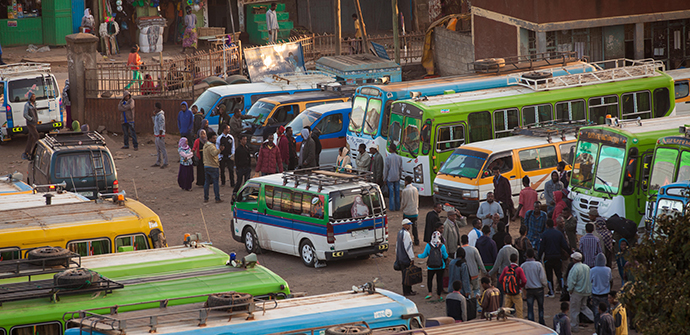
Adolescent girls and young women in low- and middle-income countries are migrating from rural to urban areas in ever greater numbers.
The study revealed a continuum—from brokers who are well-intentioned to those who deceive, sexually exploit, or traffick adolescent girls and young women into commercial sex work.
Building on these findings, Population Council researchers are implementing and evaluating Selam Medireshachen (Safe Arrival)—a program to tackle the risk of violence and trafficking. The Organization for Prevention, Rehabilitation, and Integration of Female Street Children (OPRIFS) is the service delivery partner on the initiative.
The program centers on two bus terminals in Addis Ababa which are the main entry points for girls who are migrating and where a large concentration of brokers is found. With a goal to disrupt the pattern of sexual abuse, exploitation, and trafficking, the 12-month pilot program creates a support network:
- Certified safer brokers: A cadre of agents, or “certified” brokers, trained to support safe employment
- Female “arrival allies” who are market women working in the vicinity of the bus stage: Point persons for support and advice who can connect arrivals to social services such as safe houses and shelters, health, welfare, and legal services
- Responsive law enforcement, transportation authorities, and local administration: Representatives of local agencies proficient in identifying signs of abuse and exploitation and providing active support to adolescent girls and young women who are migrating
Researchers will track and monitor participants, capturing demographic data and integrating qualitative research to gain unique insights and evaluate the effectiveness of the program.
The study includes in-depth interviews with female migrants, employment agents/brokers and female arrival allies/market women. Interviews will be conducted at three points in time, spanning recent and previous migrants and individuals who participated in the program as well as those who did not.
This is a novel project addressing a critical concern on which little research has been conducted. It is also sensitive research, as it likely involves instances of trafficking/child trafficking and/or commercial sexual exploitation of children.
The research design is centered on collecting qualitative information from migrants, brokers and female arrival allies/market women over several rounds of data collection. This research approach, undertaken over several phases, will build understanding of the process of migration, brokers, and the experiences of adolescent girls and young women—to allow for adjustments during the intervention and in subsequent rounds of research.
Results will fill a significant knowledge gap on the dynamics of migration and trafficking and contribute to future research that includes quantitative studies.
